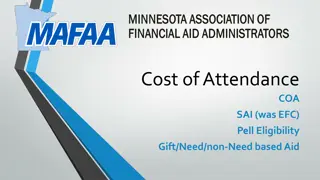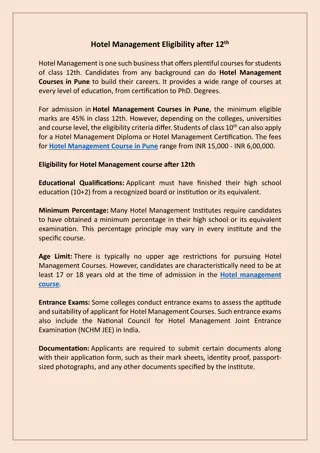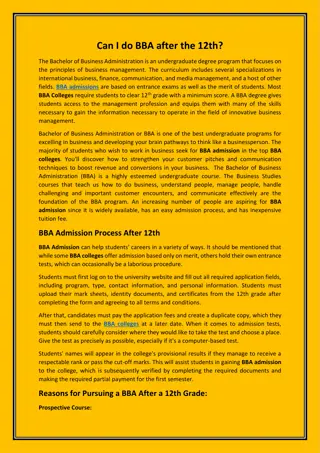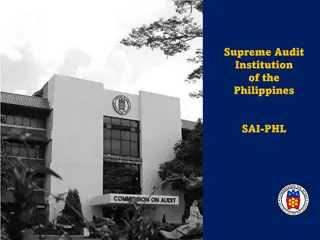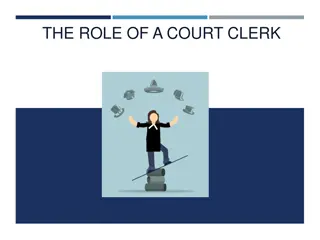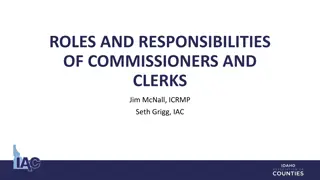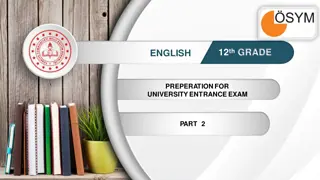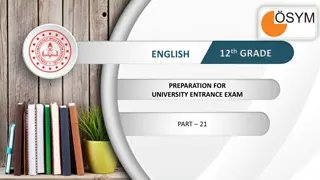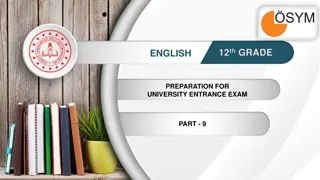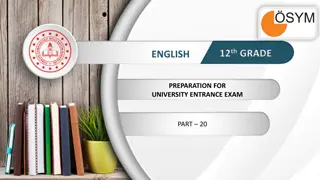
Effective Court Communication and Timely Filing Guidelines
Enhance communication between court offices for efficient filing of records and briefs to expedite decisions on appeals. Understand Texas Rules of Appellate Procedure for timely submissions. Stay on track with key timelines for motions and appeals.
Download Presentation

Please find below an Image/Link to download the presentation.
The content on the website is provided AS IS for your information and personal use only. It may not be sold, licensed, or shared on other websites without obtaining consent from the author. If you encounter any issues during the download, it is possible that the publisher has removed the file from their server.
You are allowed to download the files provided on this website for personal or commercial use, subject to the condition that they are used lawfully. All files are the property of their respective owners.
The content on the website is provided AS IS for your information and personal use only. It may not be sold, licensed, or shared on other websites without obtaining consent from the author.
E N D
Presentation Transcript
Clerks Workshop Katrina McClenny Twelfth Court of Appeals
Introduction Introduction At the Court, we encourage an open line of communication between our Clerk s office and trial court clerks, court reporters, trial judges, parties and/or their attorneys to foster a collaborative effort to file records and briefs expeditiously so that the Court may provide an expedient decision on appeals or other proceedings. By closing the loop and considering agile timeframes, we strive to help you prepare and file the records correctly and expeditiously. 5/7/2025 Clerk s Workshop November 28, 2022 2
Primary goals Primary goals Timely & Complete Clerk s Records
Texas Rules of Appellate Procedure Texas Rules of Appellate Procedure Tex. R. App. P. or TRAP (for short) Tex. R. App. P. or TRAP (for short) Rule 4. Time and Notice Provisions 4.1. Computing Time (a) In General. The day of an act, event, or default after which a designated period begins to run is not included when computing a period prescribed or allowed by these rules, by court order, or by statute. The last day of the period is included, but if that day is a Saturday, Sunday, or legal holiday, the period extends to the end of the next day that is not a Saturday, Sunday, or legal holiday. (b) Clerk's Office Closed or Inaccessible. If the act to be done is filing a document, and if the clerk's office where the document is to be filed is closed or inaccessible during regular hours on the last day for filing the document, the period for filing the document extends to the end of the next day when the clerk's office is open and accessible. The closing or inaccessibility of the clerk's office may be proved by a certificate of the clerk or counsel, by a party's affidavit, or by other satisfactory proof, and may be controverted in the same manner. 5/7/2025 Clerk s Workshop November 28, 2022 4
Timelines Timelines All Calculations are All Calculations are from the date Sentence is imposed from the date Sentence is imposed in open court or Judgment is signed in open court or Judgment is signed No Timely Motion for New No Timely Motion for New Trial Filed Trial Filed Timely Motion for New Trial Timely Motion for New Trial Filed Filed Timely Request for Findings of Timely Request for Findings of Fact and Conclusions of Law Fact and Conclusions of Law Date Sentence Imposed or Judgment Signed Date Sentence Imposed or Judgment Signed Date Sentence Imposed or Judgment Signed Notice of Appeal due in 30 days Motion for New Trial due in 30 days Request for FOF & COL due in 20 days Record due in 60 days Notice of Appeal due in 90 days Notice of Appeal due in 90 days Record due in 120 days Record due in 120 days 5/7/2025 Clerk s Workshop November 28, 2022 5
Accelerated Accelerated Civil Timelines Civil Timelines All Calculations are from the date the Calculations are from the date the Notice of Appeal is filed Notice of Appeal is filed All Accelerated Civil Appeals Accelerated Civil Appeals Date Order or Final Judgment is Signed Notice of Appeal due in 20 days Record due in 10 days Termination of Parental Rights Termination of Parental Rights Date Order of Termination is Signed Notice of Appeal due in 20 days Record due in 10 days Mental Health Mental Health Date Order or Judgment is Signed Notice of Appeal due in 20 days Record due immediately 5/7/2025 Clerk s Workshop November 28, 2022 6
Criminal Timelines Criminal Timelines Appeals of Habeas Corpus Appeals of Habeas Corpus State s Appeal State s Appeal Date Order is Signed Date Order is Signed Notice of Appeal due in 30 days Notice of Appeal due in 20 days Record due in 15 days Record due in 60 days after order is signed 5/7/2025 Clerk s Workshop November 28, 2022 7
Rule 35. Time to File Record; Responsibility for Filing Record 35.1. Civil Cases The appellate record must be filed in the appellate court within 60 days after the judgment is signed except as follows: (a) if Rule 26.1(a) (regular) applies, within 120 days after the judgment is signed; (b) if Rule 26.1(b) (accelerated) applies, within 10 days after the notice of appeal is filed; or (c) if Rule 26.1(c) (restricted) applies, within 30 days after the notice of appeal is filed. 35.2. Criminal Cases The appellate record must be filed in the appellate court: (a) if a motion for new trial is not filed, within 60 days after the date the sentence is imposed or suspended in open court or the order appealed from is signed; (b) if a timely motion for new trial is filed and denied, within 120 days after the date the sentence is imposed or suspended in open court; or (c) if a motion for new trial is granted, within 60 days after the order granting the motion is signed. 5/7/2025 Clerk s Workshop November 28, 2022 8
4.2. No Notice of Trial Courts Judgment in Civil Case (a) Additional Time to File Documents. (1) In general. If a party affected by a judgment or other appealable order has not within 20 days after the judgment or order was signed either received the notice required by Texas Rule of Civil Procedure 306a.3 or acquired actual knowledge of the signing, then a period that, under these rules, runs from the signing will begin for that party on the earlier of the date when the party receives notice or acquires actual knowledge of the signing. But in no event may the period begin more than 90 days after the judgment or order was signed. (2) Exception for restricted appeal. Subparagraph (1) does not extend the time for perfecting a restricted appeal. 5/7/2025 Clerk s Workshop November 28, 2022 9
20.1. Civil Cases (a) Costs Defined. In this rule, costs mean filing fees charged by the appellate court. Fees charged for preparation of the appellate record are governed by Texas Rule of Civil Procedure 145. (b) When a Statement Was Filed in the Trial Court. (1) General Rule; Status in Trial Court Carries Forward. A party who filed a Statement of Inability to Afford Payment of Court Costs in the trial court is not required to pay costs in the appellate court unless the trial court overruled the party s claim of indigence in an order that complies with Texas Rule of Civil Procedure 145. A party is not required to pay costs in the appellate court if the trial court ordered the party to pay partial costs or to pay costs in installments. (c) When No Statement Was Filed in the Trial Court. An appellate court may permit a party who did not file a Statement of Inability to Afford Payment of Court Costs in the trial court to proceed without payment of costs. The court may require the party to file a Statement in the appellate court. If the court denies the party s request to proceed without payment of costs, it must do so in a written order. 5/7/2025 Clerk s Workshop November 28, 2022 10
NOTE: NOTE: - Preparation cost and payment status should be provided on the TAMES RSP filing screen. - Please do not file a record if you have not received the preparation cost. 5/7/2025 Clerk s Workshop November 28, 2022 11
Rule 25. Perfecting Appeal 25.1. Civil Cases (a) Notice of Appeal. An appeal is perfected when a written notice of appeal is filed with the trial court clerk. If a notice of appeal is mistakenly filed with the appellate court, the notice is deemed to have been filed the same day with the trial court clerk, and the appellate clerk must immediately send the trial court clerk a copy of the notice. 25.2. Criminal Cases (a) (d) Certification of Defendant s Right of Appeal. If the defendant is the appellant, the record must include the trial court s certification of the defendant s right of appeal under Rule 25.2(a)(2). The certification shall include a notice that the defendant has been informed of his rights concerning an appeal, as well as any right to file a pro se petition for discretionary review. This notification shall be signed by the defendant, with a copy given to him. The certification should be part of the record when notice is filed but may be added by timely amendment or supplementation under this rule or Rule 34.5(c)(1) or Rule 37.1 or by order of the appellate court under Rule 34.5(c)(2). The appeal must be dismissed if a certification that shows the defendant has the right of appeal has not been made part of the record under these rules. 5/7/2025 Clerk s Workshop November 28, 2022 12
Rule 26. Time to Perfect Appeal 26.1. Civil Cases The notice of appeal must be filed within 30 days after the judgment is signed, except as follows: (a) the notice of appeal must be filed within 90 days after the judgment is signed if any party timely files: (1) a motion for new trial; (2) a motion to modify the judgment; (3) a motion to reinstate under Texas Rule of Civil Procedure 165a; or (4) a request for findings of fact and conclusions of law if findings and conclusions either are required by the Rules of Civil Procedure or, if not required, could properly be considered by the appellate court; (b) in an accelerated appeal, the notice of appeal must be filed within 20 days after the judgment or order is signed; (c) in a restricted appeal, the notice of appeal must be filed within six months after the judgment or order is signed; and (d) if any party timely files a notice of appeal, another party may file a notice of appeal within the applicable period stated above or 14 days after the first filed notice of appeal, whichever is later. 5/7/2025 Clerk s Workshop November 28, 2022 13
26.2. Criminal Cases (a) By the Defendant. The notice of appeal must be filed: (1) within 30 days after the day sentence is imposed or suspended in open court, or after the day the trial court enters an appealable order; or (2) within 90 days after the day sentence is imposed or suspended in open court if the defendant timely files a motion for new trial. (b) By the State. The notice of appeal must be filed: within 20 days after the day the trial court enters the order, ruling, or sentence to be appealed. 5/7/2025 Clerk s Workshop November 28, 2022 14
Rule 27. Premature Filings 27.1. Prematurely Filed Notice of Appeal (a) Civil Cases. In a civil case, a prematurely filed notice of appeal is effective and deemed filed on the day of, but after, the event that begins the period for perfecting the appeal. (b) Criminal Cases. In a criminal case, a prematurely filed notice of appeal is effective and deemed filed on the same day, but after, sentence is imposed or suspended in open court, or the appealable order is signed by the trial court. But a notice of appeal is not effective if filed before the trial court makes a finding of guilt or receives a jury verdict. 5/7/2025 Clerk s Workshop November 28, 2022 15
Rule 31. Appeals in Habeas Corpus, Bail, and Extradition Proceedings in Criminal Cases 31.1. Filing the Record and Briefs When written notice of appeal from a judgment or order in a habeas corpus or bail proceeding is filed, the trial court clerk must prepare and certify the clerk s record and, if the appellant requests, the court reporter must prepare and certify a reporter s record. The clerk must send the clerk s record and the court reporter must send the reporter s record to the appellate court within 15 days after the notice of appeal is filed. On reasonable explanation, the appellate court may shorten or extend the time to file the records. 5/7/2025 Clerk s Workshop November 28, 2022 16
Rule 34. Appellate Record 34.5. Clerk s Record (a) Contents. Unless the parties designate the filings in the appellate record by agreement under Rule 34.2, the record must include copies of the following: (1) in civil cases, all pleadings on which the trial was held; (2) in criminal cases, the indictment or information, any special plea or defense motion that was presented to the court and overruled, any written waiver, any written stipulation, and, in cases in which a plea of guilty or nolo contendere has been entered, any documents executed for the plea; (3) the court's docket sheet; (4) the court's charge and the jury's verdict, or the court's findings of fact and conclusions of law; (5) the court's judgment or other order that is being appealed; (6) any request for findings of fact and conclusions of law, any post-judgment motion, and the court's order on the motion; (7) the notice of appeal; (8) any formal bill of exception; (9) any request for a reporter s record, including any statement of points or issues under Rule 34.6(c); (10) any request for preparation of the clerk s record; (11) in civil cases, a certified bill of costs, including the cost of preparing the clerk s record, showing credits for payments made; (12) in criminal cases, the trial court's certification of the defendant's right of appeal under Rule 25.2; and (13) subject to (b), any filing that a party designates to have included in the record. 5/7/2025 Clerk s Workshop November 28, 2022 17
9.9 Privacy Protection for Documents Filed in Civil Cases. 9.9 Privacy Protection for Documents Filed in Civil Cases. (a) (a)Sensitive Data Defined. Sensitive data consists of: Sensitive Data Defined. Sensitive data consists of: (1) a driver's license number, passport number, social security number, tax identification number or similar government-issued personal identification number; (2) a bank account number, credit card number, or other financial account number; and (3) a birth date, home address, and the name of any person who was a minor when the underlying suit was filed. (b) Filing of Documents Containing Sensitive Data Prohibited Filing of Documents Containing Sensitive Data Prohibited. Unless the inclusion of sensitive data is specifically required by a statute, court rule, or administrative regulation, an electronic or paper document containing sensitive data may not be filed with a court unless the sensitive data is redacted, except for the record in an appeal under Section Two. (c) Redaction of Sensitive Data; Retention Requirement Redaction of Sensitive Data; Retention Requirement. Sensitive data must be redacted by using the letter X in place of each omitted digit or character or by removing the sensitive data in a manner indicating that the data has been redacted. The filing party must retain an unredacted version of the filed document during the pendency of the appeal and any related proceedings filed within six months of the date the judgment is signed. (d) Notice to Clerk document must contain sensitive data, the filing party must notify the clerk by: (1) designating the document as containing sensitive data when the document is electronically filed; or (2) if the document is not electronically filed, by including, on the upper lefthand side of the first page, the phrase: NOTICE: THIS DOCUMENT CONTAINS SENSITIVE DATA. (e) Restriction on Remote Access Remote Access. Documents that contain unredacted sensitive data in violation of this rule must not be posted on the Internet. Notice to Clerk. If a Restriction on 5/7/2025 Clerk s Workshop November 28, 2022 18
9.10 Privacy Protection for Documents Filed in Criminal Cases 9.10 Privacy Protection for Documents Filed in Criminal Cases. (a) Sensitive Data Defined. Sensitive data consists of Sensitive Data Defined. Sensitive data consists of: (1) a driver's license number, passport number, social security number, tax identification number or similar government-issued personal identification number; (2) bank account number, credit card number, and other financial account number; (3) a birth date, a home address, and the name of any person who was a minor at the time the offense was committed. (b) Redacted Filings. Unless a court orders otherwise, an electronic or paper filing with the court, including the contents of any appendices, must not contain sensitive data. (c) Exemptions from the Redaction Requirement. The redaction requirement does not apply to the following: (1) A court filing that is related to a criminal matter or investigation and that is prepared before the filing of a criminal charge or is not filed as part of any docketed criminal case; (2) An arrest or search warrant; (3) A charging document and an affidavit filed in support of any charging document; 14 (4) A defendant s date of birth; (5) A defendant s address; and (6) Any government issued number intended to identify the defendant associated with a criminal filing, except for the defendant s social security number or driver s license number. (d) Redaction procedures. Sensitive data must be redacted by using the letter X in place of each omitted digit or character or by removing the sensitive data in a manner indicating that the data has been redacted. The filer must retain an unredacted version of the filed document during the pendency of the appeal and any related proceedings filed within three years of the date the judgment is signed. If a district court clerk or appellate court clerk discovers unredacted sensitive data in the record, the clerk shall notify the parties and seek a ruling from the court. (e) Certification. The filing of a document constitutes a certification by the filer that the document complies with paragraphs (a) and (b) of this rule. 5/7/2025 Clerk s Workshop November 28, 2022 19
(f) Reference List. If a filer believes any information described in paragraph (a) of this rule is essential to a document or that the document would be confusing without the information, the filer may submit the information to the court in a reference list that is in paper form and under seal. The reference list must specify an appropriate identifier that corresponds uniquely to each item listed. Any reference in the document to a listed identifier will be construed to refer to the corresponding item of information. If the filer provides a reference list pursuant to this rule, the front page of the document containing the redacted information must indicate that the reference list has been, or will be, provided. On its own initiative, the court may order a sealed reference list in any case. (g) Sealed materials. Materials that are required by statute to be sealed, redacted, or kept confidential, such as the items set out in Articles 35.29 (Personal Information About Jurors), 38.45 (Evidence Depicting or Describing Abuse of or Sexual Conduct by Child or Minor), and 42.12, 9(j), must be treated in accordance with the pertinent statutes and shall not be publicly available on the internet. A court may also order that a document be filed under seal in paper form or electronic form, without redaction. The court may later unseal the document or order the filer to provide a redacted version of the document for the public record. If a court orders material sealed, whether it be sensitive data or other materials, the court's sealing order must be affixed to the outside of the sealed container if the sealed material is filed in paper form or be the first document that appears if filed in electronic form. Sealed portions of the clerk's and reporter's records should be clearly marked and separated from unsealed portions and tendered as separate records, whether in paper form or electronic form. Sealed material shall not be available either on the internet or in other form without court order. (h) Waiver of Protection of Identifiers Waiver of Protection of Identifiers. A person waives the protection of this rule as to a person s own information by filing it without redaction and not under seal. 5/7/2025 Clerk s Workshop November 28, 2022 20
(b) Request for Additional Items. (1) Time for Request. At any time before the clerk s record is prepared, any party may file with the trial court clerk a written designation specifying items to be included in the record. (2) Request Must be Specific. A party requesting that an item be included in the clerk s record must specifically describe the item so that the clerk can readily identify it. The clerk will disregard a general designation, such as one for all papers filed in the case. (3) Requesting Unnecessary Items. In a civil case, if a party requests that more items than necessary be included in the clerk s record or any supplement, the appellate court may regardless of the appeal's outcome require that party to pay the costs for the preparation of the unnecessary portion. (4) Failure to Timely Request. An appellate court must not refuse to file the clerk s record or a supplemental clerk s record because of a failure to timely request items to be included in the clerk s record. 5/7/2025 Clerk s Workshop November 28, 2022 21
(c) Supplementation. (1) If a relevant item has been omitted from the clerk s record, the trial court, the appellate court, or any party may by letter direct the trial court clerk to prepare, certify, and file in the appellate court a supplement containing the omitted item. (2) If the appellate court in a criminal case orders the trial court to prepare and file findings of fact and conclusions of law as required by law, or certification of the defendant's right of appeal as required by these rules, the trial court clerk must prepare, certify, and file in the appellate court a supplemental clerk s record containing those findings and conclusions. (3) Any supplemental clerk s record will be part of the appellate record. (g) Additional Copies of Clerk s Record in Criminal Cases. In a criminal case, the clerk s record must be made in duplicate, and in a case in which the death penalty was assessed, in triplicate. The trial court clerk must retain the copy or copies for the parties to use with the court s permission. (h) Clerk May Consult With Parties. The clerk may consult with the parties concerning the contents of the clerk s record. 5/7/2025 Clerk s Workshop November 28, 2022 22
Thoughts: Thoughts: - The trial court information sheet is not a Notice of Appeal (as some name it as a bookmark) - The trial court information sheet should provide all information possible; especially the email addresses of counsel - Each volume of the clerk s record should have a Cover Page, Caption Page, Index and Certification Page and the page limit for each volume should be about 350 pages. - The Bill of Costs should be at the end of the last volume and should specify the preparation cost of the clerk s record and whether it has been paid (even in indigent cases). - Please DO NOT file a record if payment is due! 5/7/2025 Clerk s Workshop November 28, 2022 23
35.3. Responsibility for Filing Record (a) Clerk s Record. The trial court clerk is responsible for preparing, certifying, and timely filing the clerk s record if: (1) a notice of appeal has been filed, and in criminal proceedings, the trial court has certified the defendant's right of appeal, as required by Rule 25.2(d); and (2) the party responsible for paying for the preparation of the clerk s record has paid the clerk's fee, has made satisfactory arrangements with the clerk to pay the fee, or is entitled to appeal without paying the fee. (c) Courts to Ensure Record Timely Filed. The trial and appellate courts are jointly responsible for ensuring that the appellate record is timely filed. The appellate court may extend the deadline to file the record if requested by the clerk or reporter. Each extension must not exceed 30 days in an ordinary or restricted appeal, or 10 days in an accelerated appeal. The appellate court must allow the record to be filed late when the delay is not the appellant s fault and may do so when the delay is the appellant s fault. The appellate court may enter any order necessary to ensure the timely filing of the appellate record. 5/7/2025 Clerk s Workshop November 28, 2022 24
Rule 51. Enforcement of Judgments after Mandate 51.1. Civil Cases (a) Statement of Costs. The appellate clerk must prepare, and send to the trial court clerk with the mandate, a statement of costs showing: (1) the preparation costs for the appellate record, and any court of appeals filing fees, with a notation of those items that have been paid and those that are owing; and (2) the party or parties against whom costs have been adjudged. (b) Enforcement of Judgment. When the trial court clerk receives the mandate, the appellate court s judgment must be enforced. Appellate court costs must be included with the trial court costs in any process to enforce the judgment. If all or part of the costs are collected, the trial court clerk must immediately remit to the appellate court clerk any amount due to that clerk. The trial court need not make any further order in the case, and the appellate court s judgment may be enforced as in other cases, when the appellate judgment: (1) affirms the trial court's judgment; (2) modifies the trial court's judgment and, as so modified, affirms that judgment; or (3) renders the judgment the trial court should have rendered. 51.2. Criminal Cases When the trial court clerk receives the mandate, the appellate court s judgment must be enforced as follows: (a) Clerk s Duties. The trial court clerk must: (1) send an acknowledgment to the appellate clerk of the mandate's receipt; and (2) immediately file the mandate. appeal. 5/7/2025 Clerk s Workshop November 28, 2022 25
Rule 24. Suspension of Enforcement of Judgment Pending Appeal in Civil Cases 24.1. Suspension of Enforcement 24.1. Suspension of Enforcement (a) Methods judgment debtor may supersede the judgment by: (1) filing with the trial court clerk a written agreement with the judgment creditor for suspending enforcement of the judgment; (2) filing with the trial court clerk a good and sufficient bond; (3) making a deposit with the trial court clerk in lieu of a bond; or (4) providing alternate security ordered by the court. (b) Bonds in the amount required by 24.2; (B) payable to the judgment creditor; (C) signed by the judgment debtor or the debtor s agent; (D) signed by a sufficient surety or sureties as obligors; and (E) conditioned as required by (d). (2) To be effective a bond must be approved by the trial court clerk. On motion of any party, the trial court will review the bond. (c) Deposit in Lieu of Bond Deposits. Instead of filing a surety bond, a party may deposit with the trial court clerk: (A) cash; (B) a cashier s check payable to the clerk, drawn on any federally insured and federally or state- chartered bank or savings-and-loan association; or (C) with leave of court, a negotiable obligation of the federal government or of any federally insured and federally or state-chartered bank or savings-and-loan association. (2) Amount of Deposit. The deposit must be in the amount required by 24.2. (3) Clerk s Duties Clerk s Duties; Interest. The clerk must promptly deposit any cash or a cashier s check in accordance with law. The clerk must hold the deposit until the conditions of liability in (d) are extinguished. The clerk must then release any remaining funds in the deposit to the judgment debtor. NOTE: Send the notice of appeal to the appellate court even if the bond is not paid. NOTE: Send the notice of appeal to the appellate court even if the bond is not paid. Methods. Unless the law or these rules provide otherwise, a Bonds. (1) A bond must be: (A) Deposit in Lieu of Bond. (1) Types of 5/7/2025 Clerk s Workshop November 28, 2022 26
Clerks Office Staff Clerk s Office Staff Please call us!!! Please call us!!! 903 903- -593 593- -8471 8471 Katrina McClenny Clerk of Court - Katrina.mcclenny@txcourts.gov Ashley Rozell Chief Deputy Clerk - Ashley.rozell@txcourts.gov Amy Sellers - Deputy Clerk - Amy.sellers@txcourts.gov 5/7/2025 Clerk s Workshop November 28, 2022 27
Thank you! Thank you! Katrina McClenny Katrina.mcclenny@txcourts.gov www.txcourts.gov/12thcoa/


